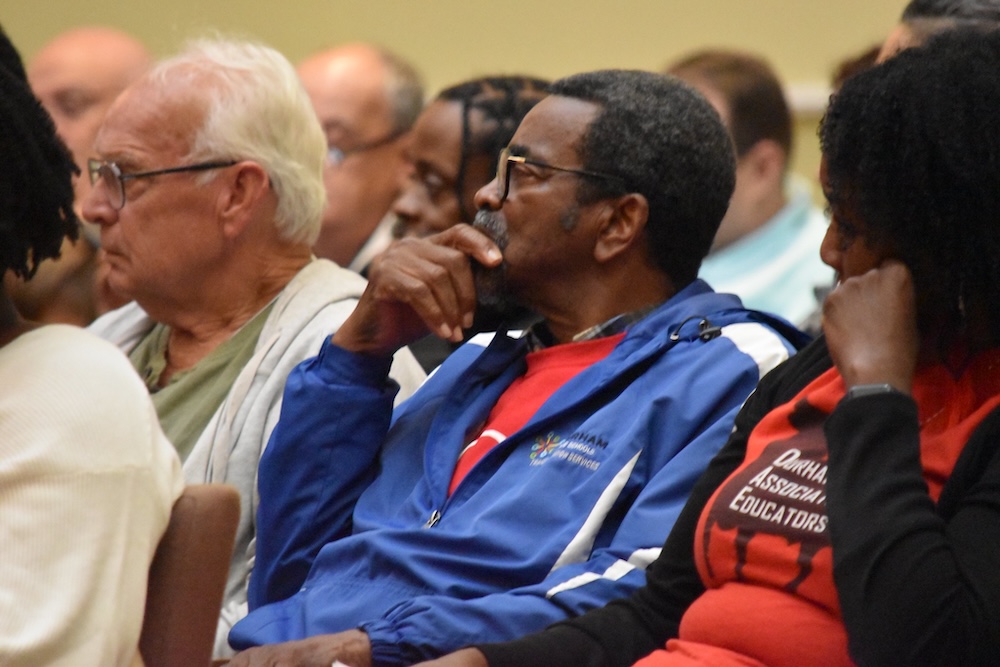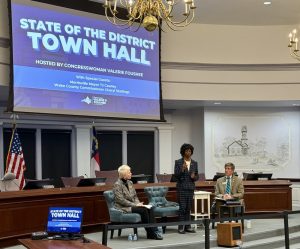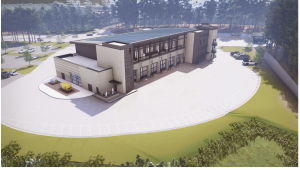Faced with the complexities of Durham’s 2026 budget at Tuesday night’s Board of County Commissioners meeting, Antoinette Hawes’ message was simple.
“Invest in humanity. Invest in teachers,” preached Hawes, wide-eyed behind her clear-rimmed glasses.
Hawes’ speech was met with a chorus of approving snaps from several audience members. Others, though, worried who would pay the price for the county’s proposed $1.04 billion budget, which would result in a tax increase.
“There’s no more money at the end of the month to add up to pay these property taxes at the end of the year. It’s already a struggle,” said Randy Coley, a senior citizen from southeast Durham.

Dozens of residents filled the chamber, many sporting red Durham Association of Educators and green People’s Alliance T-shirts and pins, to speak out against the county’s proposed 2026 budget. If enacted, the budget, which comes on the heels of a property revaluation, would raise taxes by 3.5 cents per $100 of property value. For a $200,000 home, county taxes would amount to $1108.40. Yet the budget still falls $6 million short of meeting Durham Public Schools’ (DPS) funding request.
Several employees said the school district is already understaffed and under-resourced.
Andre Cunningham, a district bus driver spoke about the financial strain of his job. He said he’s forced to rely on “side businesses” between routes just to keep up with the cost of living.
Calls for fair compensation did not only come from drivers. Social worker Sydney Schildnecht highlighted how she and her colleagues are excluded from receiving master’s pay, despite holding advanced degrees, while teacher Maggie Radack confessed fears that she would receive a salary cut and be unable to pay her mortgage.
Shanise Hamilton of the Have a HEART Coalition emphasized the need for community-led support systems in Durham schools. HEART, or Holistic Empathetic Assistance Response Team, offers nonviolent crisis response and mental health care. Hoping to expand the program’s accessibility to children and teens, Hamilton and fellow representatives sought $450,000 to place peer support specialist EMTs into elementary, middle and high schools across the county.
“In a budget where $2.6 million is allocated to school resource officers, we can’t redirect a portion of that to offer care — not policing and fear — to our children?” she asked, her voice rising with emotion.
Thirty-year school transportation veteran Retha Ruth Daniel voiced the message implicit in her coworkers’ speeches: “Our morale is in crisis,” she said firmly, her words resounding in the hushed chamber.
Aside from the occasional smattering of snaps and murmurs of approval, the speakers were met with respectful silence. Then Luna Gomez took the stand.
Her multi-colored bow headband barely cleared the mic as Gomez’s voice rang loud and clear.
“This does not just affect them, it also affects students…like me,” she concluded. The room erupted in applause.
Even amid calls to increase school funding, commissioners also heard objections to raising taxes.
Donna Stainback, a retired southeast Durham resident living on a fixed teacher’s pension, called for revisiting the appraisals that have tripled her property taxes in the last ten years. “It really puts a burden on the elderly. It is gentrification,” she said of the revaluation.
Stainback and other southeast Durham landowners fear the proposed budget, and the resulting tax increases, will bring their situations to a breaking point.
Randy Coley’s family has lived on his land for three generations, but with the steady rise in property taxes, he worries for the future. “I’m hoping the fourth generation can handle it but the way it looks I’m going to lose it,” he said.
After the hearing, board chairwoman Nida Allam noted that North Carolina state law prevents a graduated property tax. Counties must charge flat rates regardless of income or ability to pay.
“We’re stuck within these constraints of a broken revenue system for the local government,” she explains.
Durham Association of Educators President Mika Twietmeyer urged generous funding of Durham Public Schools, cautioning that “with less potential funding, DPS is facing an impossible decision.”
For many Durham residents, whether farmers, students, or bus drivers, so, too, is the county.
Pictured above: Dozens turned out Tuesday for a public hearing on next year’s proposed county budget. Photo courtesy of Durham County Government.
Marin Yearley





